The mammoth effort behind an annual donation drive of hundreds of thousands of used textbooks
More than 700,000 used textbooks went up for donation at this year's FairPrice Share-A-Textbook event.
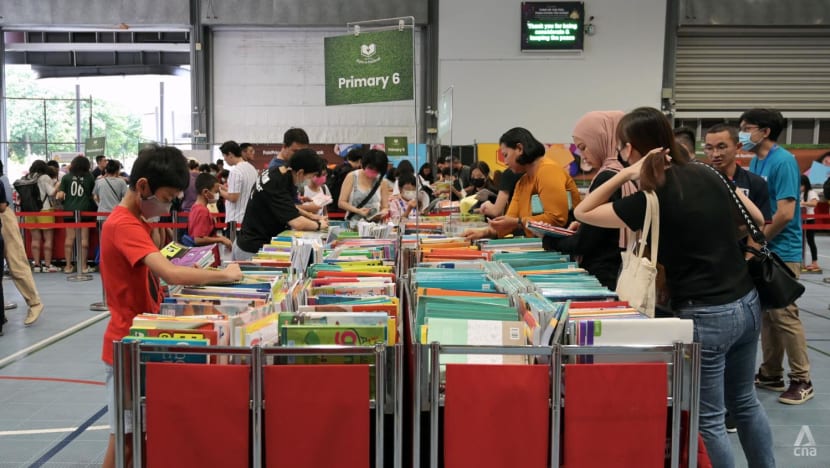
People browse through donated used textbooks at FairPrice Share-A-Textbook 2022. (Photo: CNA/Marcus Mark Ramos)
SINGAPORE: The scene at an exhibition area at Our Tampines Hub on Dec 10 could have looked like a Black Friday sale, when some shoppers go on a mad rush to grab heavily discounted items from stores.
Instead, the crowd comprised mostly parents, some with their children, waiting patiently for their turn to get their hands on free used textbooks. Some of them brought suitcases, reusable bags and cardboard boxes on trolleys. The kids had their own smaller backpacks.
The books were sorted by subject and level - from Primary 1 to Secondary 5 - and displayed on tables littered across the large space. There was also a smaller section for tertiary and other books, including encyclopedias, dictionaries and fiction books.
"You have five minutes left," a volunteer announced on the PA system. The crowd already inside finished up their selection and gradually filed out of the area, as volunteers in blue lanyards started restocking the textbooks from numerous boxes under the tables.
Those waiting were eventually allowed inside. There were no limits on how many books could be taken, although each time slot was about half an hour long.
This year's FairPrice Share-A-Textbook project - its 40th edition - has put up for grabs 725,000 used textbooks donated by the public to help needy students and promote recycling.
Dec 10 was the first day of collection reserved for 25,000 students between seven and 16 years old. These students, from low-income families, were selected by Community Development Councils and social service organisations. The public was given access on Dec 11 and Dec 12.
Some beneficiaries CNA spoke to lauded the initiative for ensuring old textbooks do not go to waste, highlighting how new textbooks could be very expensive. Others said they were unsure if the project would continue in the longer term, given that e-learning continues to feature prominently in the school curriculum.
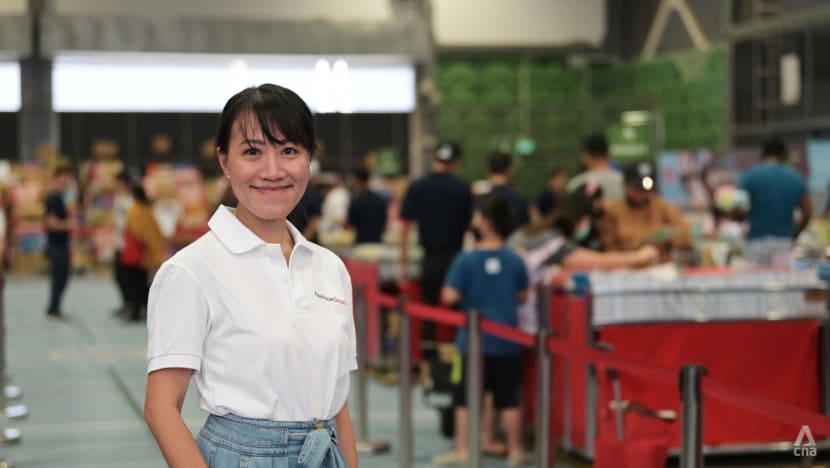
Ms Karen Tan, corporate communications lead (events management) at FairPrice Group, told CNA that the response from beneficiaries has been "very encouraging".
"In fact, all the time slots that we have put up have been fully taken, so it continues to stay relevant," she said.
"Nothing beats having a book where you can flip, scribble, highlight and all that. So, this project continues to complement ... the ongoing digitalisation of reading materials."
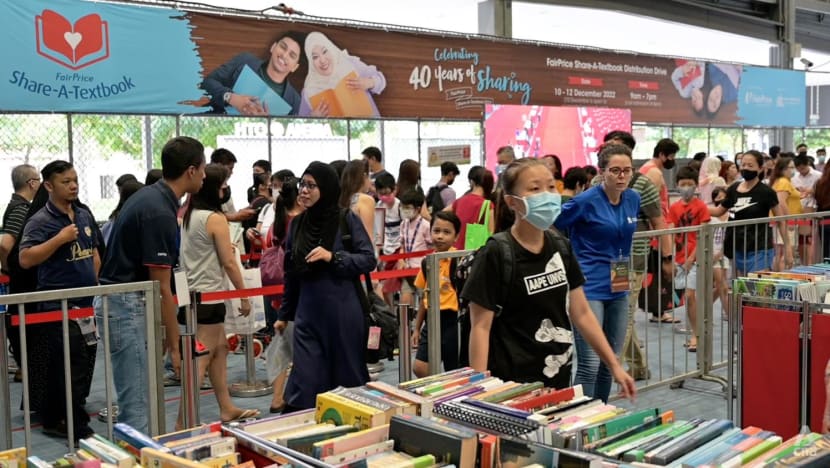
In response to queries from CNA, the Ministry of Education (MOE) said print textbooks, complemented by digital learning materials and tools, will continue to be part of a "repertoire of learning materials" to support students' learning.
"Schools can select and adopt various learning materials to meet their students' learning needs," an MOE spokesperson said.
"Students can also play their part to help those in need by donating their used textbooks."
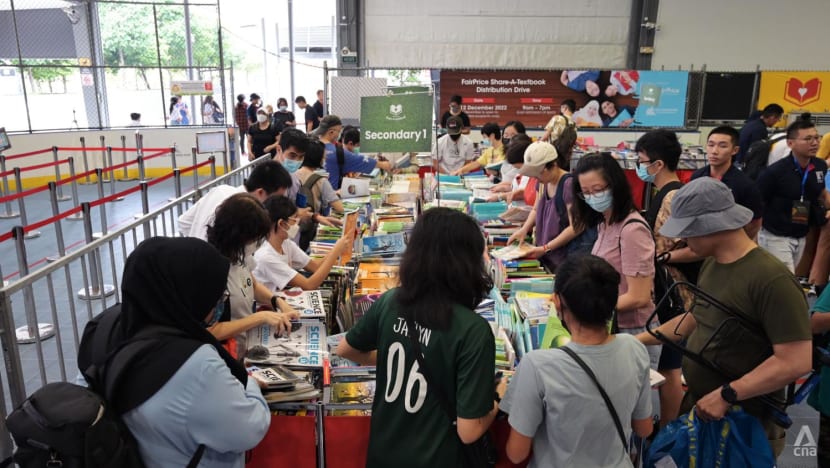
Still, behind FairPrice's initiative is a mammoth effort requiring 2,700 volunteers - the largest sign-up so far - and more than 16,200 man-hours to collect, sort and organise the textbooks.
The volunteers come from community partners and schools. They also include FairPrice Group staff and members of the public.
HOW BOOKS ARE SORTED
Planning for this year's project started in July, when Ms Tan - who has organised it since 2008 - and her team started looking at the upcoming educational curriculum and and reaching out to FairPrice Group's 150 community partners.
These partners helped to mass collect the textbooks, promote the project and send in volunteers. The project was then launched in end-October to early November.
"Why we do that is because we want to coincide that together with the school holiday period. So after exams, parents will be more willing to give their textbooks and all that," Ms Tan said.
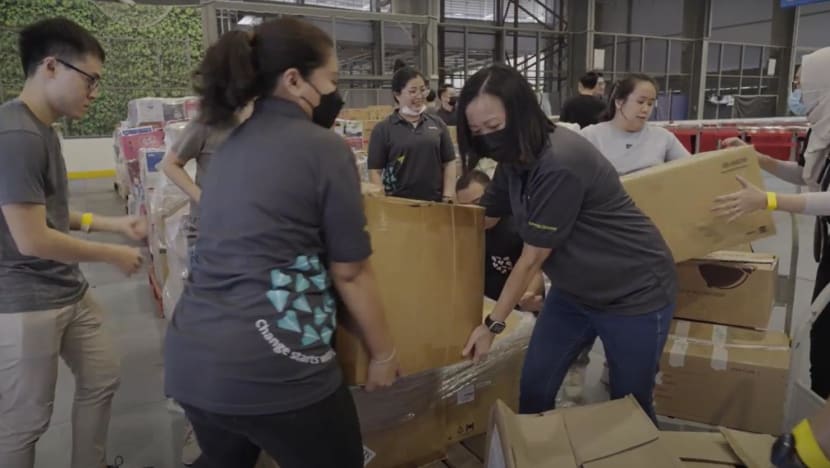
Members of the public donated their used textbooks over one-and-a-half months at 177 collection points, including FairPrice supermarkets and FairPrice Xpress outlets at Esso service stations.
In fact, FairPrice extended its donation deadline from Nov 30 to Dec 7 to ensure it could hit its target of 500,000 textbooks, and Ms Tan said it was "very heartening" that this threshold was eventually exceeded.
During the collection period, logistics vehicles went to the collection points every day and transported the books to FairPrice's warehouse and then on to Our Tampines Hub for sorting.
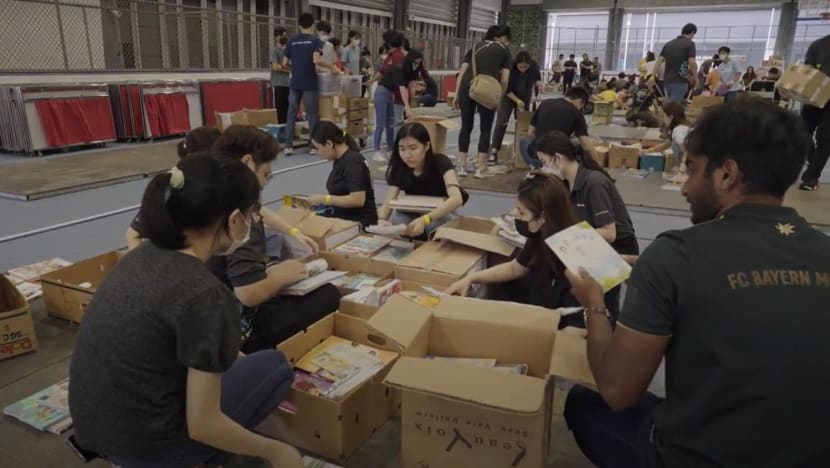
This is when the project gets a bit trickier. Over three weeks starting in November, volunteers signed up for six-hour shifts to sort the books, checking them against an MOE list for relevance and ensuring they are not completely used.
"The volunteers have been really having a really tough yet meaningful experience sorting books. Some of these books that are useable would be those that are not torn and tattered, don't have a lot of scribbles and all that," Ms Tan said.
"We do come across books that have missing pages, like almost three-quarters of the book are missing. So those are primarily taken out. And then we start to sort it according to academic level and subject."
WHAT VOLUNTEERS DO
Secondary 4 student Nicole Wee, 16, started volunteering in 2020 as a way of doing something meaningful and recharging after weeks of studying. She had also benefited from the project a year before.
"I thought (the initiative) was pretty helpful because textbooks are unreasonably expensive. People will buy the books then they will just throw away and it’s pretty new," she said.
In 2020, Ms Wee estimated that she sorted hundreds if not thousands of textbooks each day, looking out for an MOE stamp that indicates curriculum relevance and excessive scribbles that would make the book unuseable.
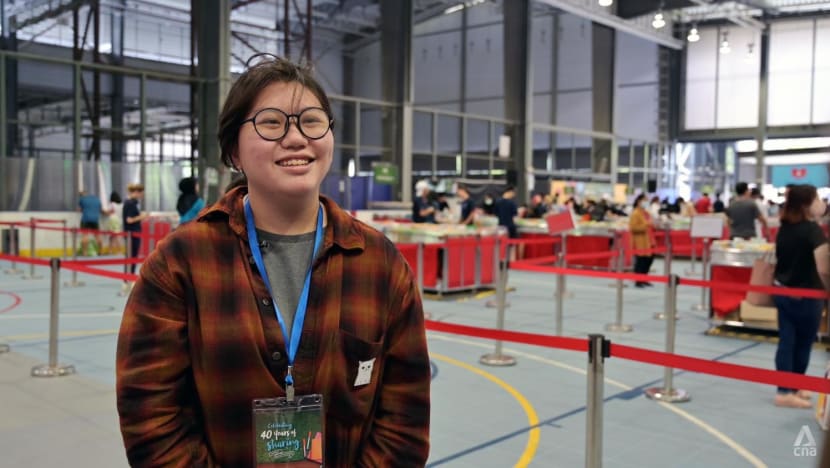
"Our marker is like 80 per cent used, then we recycle. If not, I think the parents will still use. Even better if (the scribbles are) done in pencil, then the parents can just erase," the CHIJ Secondary (Toa Payoh) student said.
"Some books don't have the MOE stamp ... so it's hard to determine (relevance). There's like a wide margin for error when we're sorting the books. We can ask some of the people who are in charge."
This year, Ms Wee's experience has promoted her to a volunteer leader, so those queries come to her. And instead of sorting books, she unloads the freshly arrived books from pallets for others to sort, and repacks them in marked boxes for the distribution days.
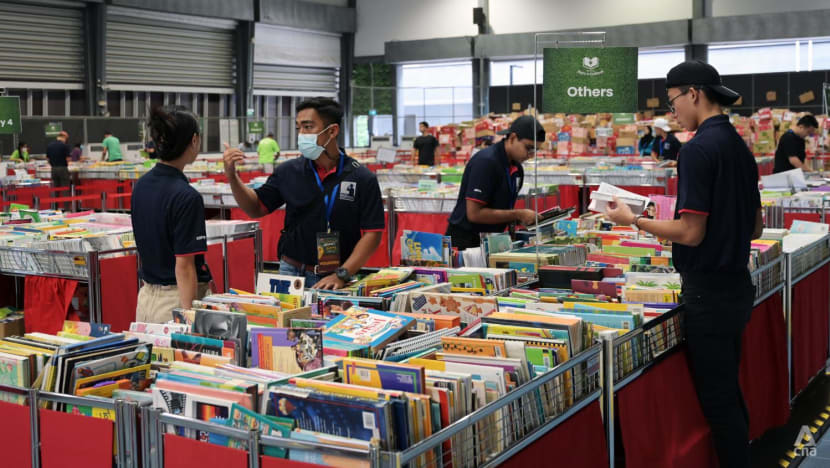
Secondary 3 student Ariel Siow, 15, said this was her second year volunteering after her mother, who also volunteered last year, brought her along as part of family bonding time.
The Zhonghua Secondary student said it was exhausting sifting through hundreds of books for eight hours each day.
"The only challenge was like being tired and not knowing whether I should go tomorrow to volunteer. But in the end I just pushed myself," she said.
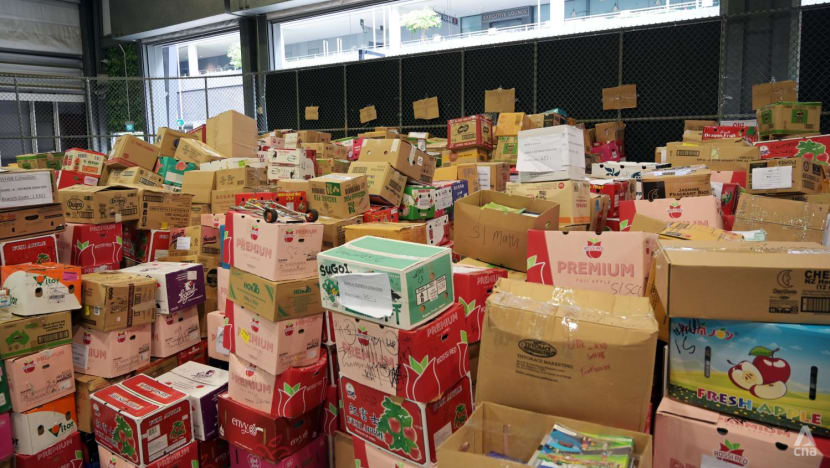
Ms Siow said her favourite part of volunteering is getting away from the boredom at home and meeting new people.
"I'm a very closed-off person, so I want to expose myself to other people so I can be more outgoing, I guess," she added.
"I think (the initiative) is good because textbooks are really expensive. Giving them a chance to collect free textbooks just helps them."
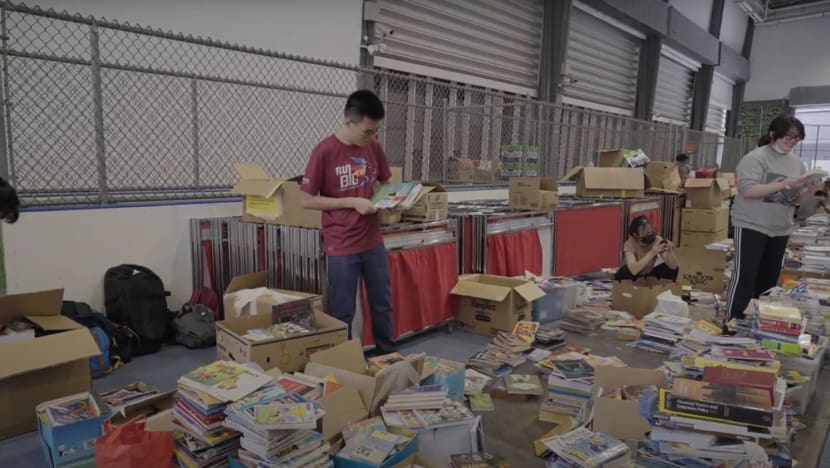
The MOE spokesperson said its financial assistance scheme helps to defray the cost of basic school expenses, including essential school supplies, for students from lower-income households.
Primary and secondary school students on the scheme will get free textbooks and uniforms, full subsidies for school and standard miscellaneous fees, as well as transport and meal subsidies to help with their expenses.
Students who do not quality for the MOE scheme can also apply for school-based financial assistance schemes or other schemes administered by their schools, grassroots organisations or external social service agencies, the spokesperson added.
SAVING MONEY AND THE EARTH
One beneficiary, St Patrick's School Secondary 1 student Ariffin Kamarulzaman, left Our Tampines Hub pulling along a silver suitcase containing about 60 textbooks and revision papers across various subjects.
"It's good because you don't have to pay money for the books and you get to save the Earth," the 13-year-old said, adding that this was his third year getting free textbooks.
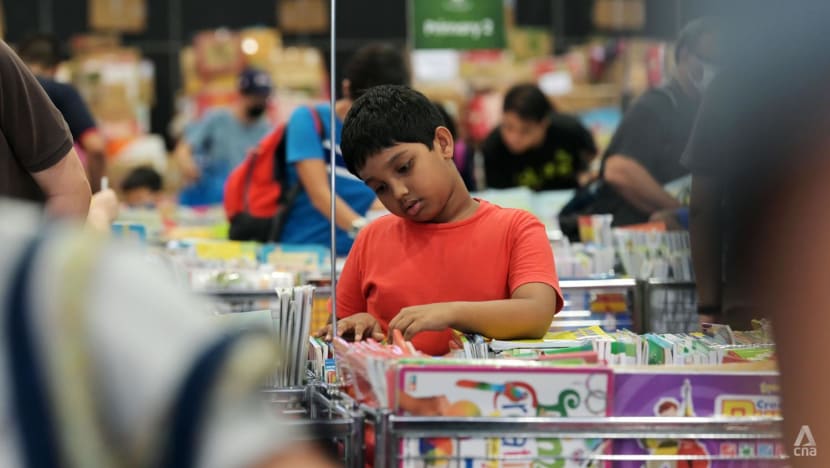
Parent Alvin Tan, 47, said it was also his third time collecting free textbooks, this time for his two children and a nephew and niece. Each booking slot is limited to two people to ensure public safety amid the pandemic.
"I took mostly assessment books for revision. We don't go for textbooks because textbooks are school-specific, so it's not easy but still can be done," he said, adding that he "easily" grabbed 20 books.
"This is a very good initiative. It helps to reuse and recycle, and at the same time, save the Earth and also save money."
Mr Tan, who works in the aviation industry, said his daughter - who is in Secondary 2 - appreciated the free books as they were in good condition, although he noted that he will wait and see if the initiative will continue in the near future.
"The schools these days are going online. In fact, a lot of notes and assessments are e-learning. So, we shall see (how) things unfold," he added.
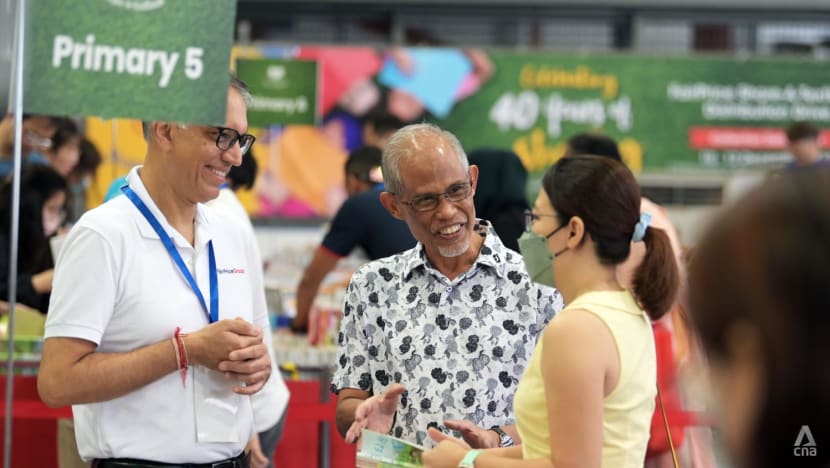
Another parent, Ms Ann Lin, said she has been benefiting from the project for the past 10 years, since her son was in Primary 1 until now when he is in Secondary 4.
"It's positive because it encourages people to protect the environment," said Ms Lin, who is in her mid-40s and works in the healthcare industry.
"So, I hope I can continue (collecting textbooks) for his tertiary education, but I believe that will be more on using laptops and downloading e-books."
While Ms Lin said she does not see the project being viable in another decade given the move towards e-learning, she believes that has benefits too.
"You also save them from carrying heavy bags in school so it will not be unhealthy for their posture," she added.
















